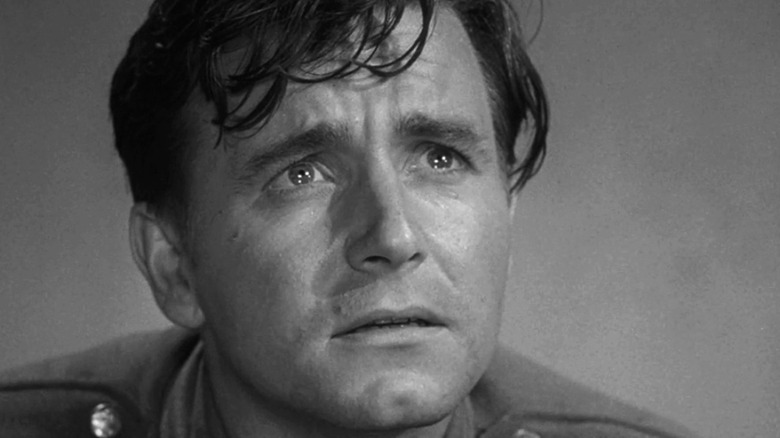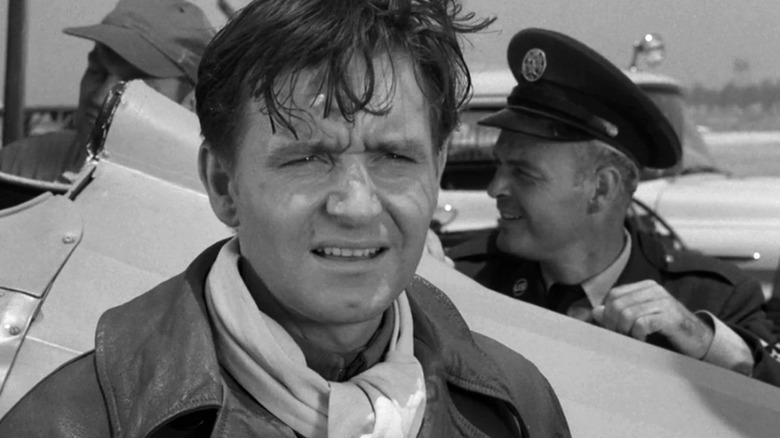This Twilight Zone Episode Was So Similar To Another Story That Rod Serling Almost Bought The Rights
This post contains spoilers for season 1, episode 18 of "The Twilight Zone."
"The Twilight Zone" creator Rod Serling opens "The Last Flight" with his telltale narration, setting the stage for one Terry Decker (Kenneth Haigh), a flight lieutenant who is "hopelessly lost." This season 1 episode dabbles in yet another unwitting act of time travel, much like the Russell Johnson-led episode "Back There," which emphasizes that only small fragments of the past can be changed. Terry, however, isn't stuck in the past, but transported to the near future after he passes through a strange cloud while flying. When those in the future detain him after being baffled by his identity and outdated uniform, Terry learns that he is currently in 1959, not 1917. Although the aerial base's commander and his men are suspicious of Terry's sudden appearance, the episode's core conflict is purely internal, as Terry must reckon with the past to deal with his mysterious journey to the future.
In keeping with the anthology show's most prevalent themes, "The Last Flight" hones in on Terry's guilt concerning his flying partner, Alexander (Robert Warwick), who died after he abandoned him during the Blitz. The officers in 1959 refute this, as they claim that Alexander is still alive, and that he is known for being a war hero who saved thousands. Although Terry is distressed at first and admits to his own cowardice, he suddenly realizes that life has given him another chance. If Alexander survived in this timeline, that would mean that someone saved him, and Terry takes it upon himself to be that person. The rest, although predictable, is a standard morality tale about owning up to your mistakes by altering history. Here, the titular Twilight Zone emerges as a benevolent liminal space that offers second chances tinged with bittersweet hope.
This classic episode was penned by regular collaborator Richard Matheson (who also wrote the script for the brilliant "Nightmare at 20,000 Feet"), and Serling immediately took a liking to it during the script proposal stage. However, closer inspection revealed that the story had major similarities with a lesser-known radio program episode. Here's what happened next.
Serling tried his best to purchase the rights for the radio episode, but failed
In 1959, Matheson pitched the idea of a lost World War I pilot displaced in time, who must acknowledge his cowardice and right a wrong when given the chance. Although this was rather thematically simple, Matheson found the premise compelling enough to keep fleshing out the finer details. According to Martin Grams Jr.'s "The Twilight Zone: Unlocking the Door to a Television Classic," Matheson wrote the teleplay soon after, which is Serling pointed out similarities between the story and an episode of Wyllis Cooper's radio anthology "Quiet, Please!"
Now, Cooper's show was tonally different from "The Twilight Zone," but it often featured tales that blended fantasy and horror, with Cooper acting as a versatile narrator. The radio series didn't get immediate traction during its run, but has been hailed as a foundational radio drama (that brimmed with fresh, original stories) in retrospect.
Titled "One for the Book," the episode in question (which you can listen to here) revolves around U.S. Air Force Captain Max Westlake. Max seems fascinated by stories that speculate about cutting-edge technology of the future, and the episode is presented from his point of view, as he narrates his journey from sergeant to major over the years. While recollecting, Max talks about a night in 1937 when he sees a man crash-landing and being taken to the local hospital. The radio episode keeps us on our toes by weaving the story with great suspense, and we eventually learn that the injured man is none other than Max himself — from the future! The limits of science are questioned, along with the concept of perpetual technological advancement that can potentially turn outlandish ideas into commonplace reality.
Per Grams' book, Serling regarded this story as really similar to the one that Matheson had proposed, calling it "almost a twin" in terms of thematic overlap. Serling tried to track Cooper down to purchase the rights for "One for the Book," but was unable to do so for reasons unknown to us. Well, that was that, and Matheson's teleplay went ahead as intended, save for a few revisions aimed at bolstering plausibility.
This is the perfect opportunity to check out "Quiet, Please!" in its entirety. Cooper's radio show truly stands out due to its clever use of metafictional narratives that challenge storytelling expectations within the medium.

